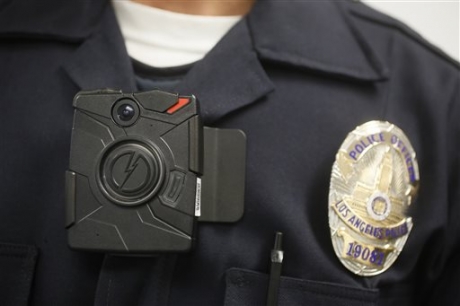Login | April 24, 2024
Ohio courts look to higher achievements for veterans courts
This Jan. 15, 2014, file photo, a Los Angeles Police officer wears an on-body cameras during a demonstration for media in Los Angeles. A small number of Cleveland patrol officers will take to the streets Wednesday, Feb. 4, 2015, equipped with new city-owned body cameras, technology that officials hope will provide more accountability within the troubled department and close the gap of mistrust of police within the community. Cleveland joins a growing roster of big cities that equip officers with body cameras, including Los Angeles, which announced a plan in December to provide them to 7,000 officers. (AP Photo/Damian Dovarganes, File)


CSABA SUKOSD
Supreme Court
Public Information Office
Published: June 10, 2019
During a week of solemn memorials to the soldiers and sailors who died for the United States, the Ohio Supreme Court hosted a seminar about veterans who return from service, become involved in the criminal justice system, and benefit from special local courts.
Organizers from the nonprofit Center for Court Innovation (CCI) met in Columbus with judges, court, and law enforcement personnel and federal officials to develop a strategic plan for growing and improving veterans treatment courts.
“Sometimes the personal risks of serving our country in uniform extend to the return to civilian life,” Chief Justice Maureen O’Connor explained. “When veterans’ lives collide with the justice system, we need courts that understand their problems and the paths to getting their lives back on track. That is the aim of Ohio’s veterans courts.”
Because of the notable track record of its 24 veterans courts, Ohio became one of five states selected by the U.S. Justice Department’s Bureau of Justice Assistance to receive technical assistance and a $200,000 grant to implement an Ohio Supreme Court-led strategic plan. Three days of meetings were held during Memorial Day week, and the work on goals and strategies will continue for another month.
“Strategic planning does not sound fun. But it’s like putting puzzle pieces together,” said Monica Christofferson, a senior program manager for CCI. “It can be really inspiring.”
Based in New York, CCI works with courts to create, test, and disseminate improvements in the justice system, with goals that include helping victims, reducing recidivism, and raising public trust in the U.S. justice system.
Ohio’s 24 veterans courts – whose operations are certified by the Supreme Court – recognize court participants’ problems, including substance use disorders, trauma, and mental illness. They offer behavioral health aid in place of punitive sanctions such as incarceration. They are among the 254 specialized dockets in Ohio that aim to reduce recidivism, improve treatment, and reduce costs to taxpayers. More than 150 of the special courts are drug courts.
The discussions at the Thomas J. Moyer Ohio Judicial Center included outreach by conference call to judges, court coordinators, probation staff, prosecutors, defense attorneys, corrections personnel, veterans’ justice outreach specialists and treatment providers. Each group’s ideas about improving the system were distilled into plans.
“We kind of know we’re doing the right thing, and it will continue to grow because of the association we’re starting here at this table,” said Cleveland Municipal Court Judge Charles Patton, who’s had his specialized veterans docket certified since 2012. “Our goal is reaching into more communities in the state.”
The implementation of a veterans treatment court is a volunteer effort by each jurisdiction. The willingness of judges, the courts, and the other entities to help with certification comes from a desire to make a difference and help those who served and sacrificed for the country. According to CCI, that passion has put Ohio at the forefront of these efforts.
“One of the huge strengths that Ohio has is its dedication to the veteran community,” Christofferson said.
Many times, she said, these court professionals “are doing this work without any additional funding, and they’re going above and beyond their regular job descriptions to allow for a veterans treatment court to work and grow.”
